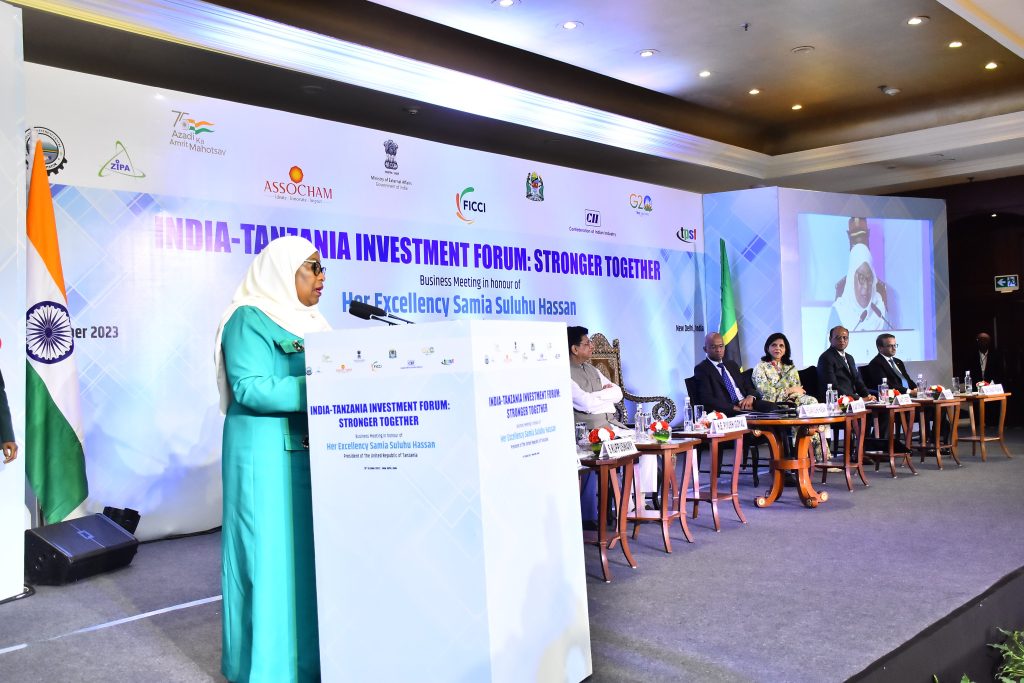Emerging economies like Tanzania must foster a thriving tech startup ecosystem in a global landscape driven by technological advancements and innovation.
As members of the Tanzania Startup Association embark on a tour of India, particularly New Delhi, to attend the Tanzania-India Business and Investment Forum on the 10th of October, there’s a remarkable opportunity for Tanzanian tech startups to glean valuable insights from India’s tech and innovation ecosystem.

Tanzania, a nation rich in natural resources, has long been recognized for its exports, including cashew nuts, cotton, jute, and more. However, in today’s interconnected world, economic growth increasingly relies on technology-driven industries. With its impressive strides in technology and innovation, India is an ideal model for Tanzanian startups seeking to diversify and advance their economy.
Also read Tanzania-India Relations: Analysis of President Samia’s Visit to India.
- Embracing a Culture of Innovation
India’s tech scene is synonymous with innovation, driven by a culture encouraging experimentation and learning from failures. Tanzanian startups can benefit immensely from adopting a similar mindset. Innovation doesn’t always guarantee success, but it paves the way for growth and discovery.
As they engage with Indian startups and entrepreneurs, Tanzanian businesses should prioritize a culture of innovation. India’s remarkable journey in digital payments through platforms like Paytm showcases the power of creation. Tanzanian startups should learn that Paytm’s initial failures and persistent innovation paved the way for it to become a global leader in mobile payments.
- Investing in Education and Skill Development
India’s renowned universities and technical institutes have played a pivotal role in producing a skilled workforce that fuels the tech industry. Tanzanian startups can draw inspiration from this and invest in education and skill development initiatives.
Collaborations with Indian educational institutions and industry experts could help bridge the knowledge gap. India’s Indian Institutes of Technology (IITs) have consistently produced top-tier tech talent. Tanzanian startups could partner with educational institutions like IITs to bolster their tech workforce.
- Leveraging the Power of Networking
The Tanzania-India Business and Investment Forum presents a golden opportunity for Tanzanian startups to network with Indian entrepreneurs and investors. India’s tech ecosystem thrives on strong networking connections that open doors to funding and collaboration.
Establishing meaningful relationships can be a game-changer for Tanzanian startups seeking to scale their operations. Indian entrepreneurs often credit their success to strong networking connections.
Tanzanian startups should observe how Indian tech giants like Infosys and Tata Consultancy Services have used networking to expand globally and secure critical partnerships.
- Government Support and Policies
India’s government has introduced several policies and initiatives to foster innovation and entrepreneurship. Tanzanian startups should engage with their government to develop similar frameworks that incentivize innovation and provide support for tech ventures. Collaborative efforts between the government, startups, and investors can create a conducive environment for growth.
India’s “Make in India” and “Startup India” initiatives provide a supportive regulatory environment for tech startups. Tanzanian startups can look at these policies as models to encourage domestic innovation. In Tanzania, through the Tanzania Startup Association, there is an advocacy for a startup act which is under review after the submission of a baseline study two years ago.
- Access to Venture Capital and Funding
One of the key drivers of India’s tech success story has been the availability of venture capital and funding opportunities. Tanzanian startups should explore avenues for attracting investment, both domestically and internationally. They can learn from India’s approach to nurturing a robust investors and venture capitalists ecosystem.
Indian startups have attracted significant global investments. Tanzanian startups should examine companies like Flipkart, which secured billions in funding from international investors, as an example of what can be achieved.
- Focus on Local and Global Markets
India’s tech startups have excelled not only in their domestic market but also on the global stage. Tanzanian startups should aim for a similar dual focus. Building products and services that cater to local needs while eyeing global expansion can be a winning strategy.
The success of Indian companies like Zoho, which offers software solutions catering to local and international markets, exemplifies the benefits of a dual-focus strategy that Tanzanian startups can emulate.
- Collaborative Ecosystems
India’s tech ecosystem thrives on collaboration. Tanzanian startups should explore partnerships with both Indian and international tech companies. Collaborative ecosystems often lead to knowledge sharing, resource access, and accelerated growth.
India’s collaborative ecosystem has led to the creation of innovation hubs like Bangalore’s Electronic City. Tanzanian startups should explore partnerships similar to the ones that have driven India’s tech industry forward.
- Embracing Emerging Technologies
With emerging technologies like artificial intelligence, blockchain, and IoT gaining prominence, Tanzanian startups should keep pace with these trends. Learning from Indian startups that have successfully integrated emerging technologies into their business models can be instructive.
Indian startups like Niki.AI have harnessed artificial intelligence to provide innovative solutions. Tanzanian startups should monitor such developments and consider integrating emerging technologies into their business models.
- Inclusive Growth
India’s tech ecosystem has seen a surge in startups focusing on social impact and inclusive growth. Tanzanian startups should consider the social aspects of their businesses, aiming to address local challenges while creating economic opportunities.
Startups like Zaya Learning Labs in India are addressing the issue of education accessibility. Tanzanian startups should consider the social impact aspect of their businesses to create lasting positive change.
- Patience and Resilience
Building a successful tech startup is fraught with challenges and setbacks. Tanzanian entrepreneurs should take inspiration from the resilience displayed by Indian startups. It’s essential to remain patient and steadfast in pursuing long-term goals.
The strength shown by Indian startups during challenging times, such as the Dot-Com Bubble, should serve as inspiration. Tanzanian entrepreneurs should understand that setbacks are part of the journey and that perseverance is key to long-term success.
The Tanzania-India Business and Investment Forum presents a unique occasion for Tanzanian tech startups to immerse themselves in the dynamic Indian tech and innovation ecosystem. Tanzanian businesses can leapfrog into a brighter, tech-driven future by embracing a culture of innovation, investing in education, networking, and adopting policies conducive to startups.
As they engage with their Indian counterparts, Tanzanian startups have an invaluable opportunity to learn from the giants and carve a path toward sustainable growth and prosperity. The journey may be challenging, but the rewards are boundless, and the future is filled with potential.

